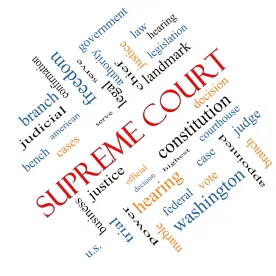Highlights:
On Feb. 28, the Supreme Court agreed to hear a case challenging the constitutionality of the Indian Child Welfare Act (ICWA), which raises several questions, including:
Does ICWA unconstitutionally discriminate on the basis of race in requiring state custody proceedings to give preference to placing an “Indian child” with “(1) a member of the child’s extended family; (2) other members of the Indian child’s tribe; or (3) other Indian families” rather than with non-Indian adoptive parents?
Do ICWA’s placement preferences pass the rational-basis test?
Do the plaintiffs have standing to bring an equal protection challenge to ICWA’s placement preferences?
Do ICWA and its implementing regulations unconstitutionally commandeer states or otherwise exceed Congress’s authority under Article I of the Constitution?
Does the authority that ICWA and its implementing regulations confer upon individual Indian tribes violate the nondelegation doctrine?
The U.S. Supreme Court issued an order list on Feb. 28 that added one more case to its docket for its next term: a constitutional challenge to the Indian Child Welfare Act of 1978 (ICWA), a federal law that regulates custody proceedings involving “Indian children.”
The unusually complicated case, Haaland v. Brackeen, caused the en banc U.S. Court of Appeals for the Fifth Circuit to issue a splintered set of opinions spanning 325 pages that accepted some of the challengers’ arguments and rejected others; the result was so complex the Fifth Circuit’s attempt to summarize the upshot of its various opinions was itself six pages long. The parties – the challengers, the defendant federal agencies, and several Native American tribes that intervened to support ICWA – then separately filed four cert. petitions that sought review of issues on which they lost in the Fifth Circuit.
The Supreme Court has now granted all four petitions. The petitions together raise 12 somewhat overlapping questions – questions that traverse several constitutional doctrines, including equal protection, standing, anticommandeering, and nondelegation. The Court’s answers to these questions not only will decide the validity of a four-decade-old statute, but also will have significance well beyond ICWA.
The Indian Child Welfare Act
Haaland v. Brackeen involves challenges to several provisions of ICWA and its implementing regulations, but the case’s central dispute concerns ICWA’s placement preferences: ICWA provides that “In any adoptive placement of an Indian child under State law, a preference shall be given, in the absence of good cause to the contrary, to a placement with (1) a member of the child’s extended family; (2) other members of the Indian child’s tribe; or (3) other Indian families.”
The challengers argue that this provision discriminates against non-Indian adoptive families on the basis of racial classifications and thereby violates the equal protection component of the Fifth Amendment – and that it fails rational-basis review in any case. In response, the federal government and the tribes contend that ICWA’s placement preferences are political, not racial, classifications and are thus subject to rational-basis scrutiny – scrutiny the preferences survive, they contend, because they are rationally related to the government’s interest in seeing Indian children placed in settings most likely to foster a connection with their tribes and culture.
The federal government and tribes further contend that the challengers lack standing to raise their equal protection claim in the first place, arguing that the state plaintiffs lack standing to invoke the Fifth Amendment rights of their citizens against the federal government, and that the individual plaintiffs have failed to identify an injury that would be redressed by a favorable judgment on this issue. The challengers, meanwhile, argue for standing on the theory that a judgment against the placement preferences would eliminate increased regulatory burdens some of the individual plaintiffs would otherwise face in ongoing adoption proceedings.
Beyond equal protection, the case includes an anticommandeering challenge – to the placement preferences and to several other ICWA provisions and implementing regulations – as well as a nondelegation challenge to an ICWA provision that authorizes tribes to alter ICWA’s order of placement preferences in cases involving children of that tribe. The former challenge presents the question whether ICWA unconstitutionally commands state courts and state child-welfare agencies or instead lawfully imposes a preemptive federal rule states must follow. And the latter challenge presents the question whether ICWA unconstitutionally gives tribes the power to change federal law or instead lawfully incorporates the laws of Indian tribes.
This case, in sum, presents a broad assortment of constitutional issues, and the Supreme Court is now set to resolve these issues in what is likely to be a major case next term. States and Native American tribes, along with many other entities affected by these constitutional-law issues in other contexts, will be following the case closely.




 />i
/>i
